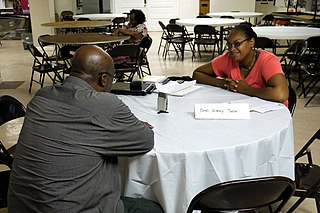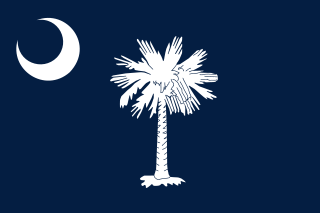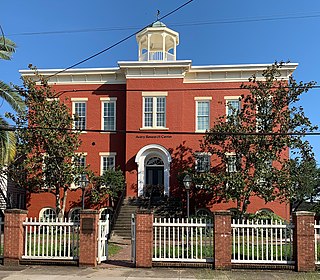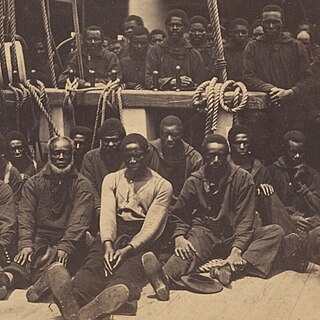Related Research Articles

Oral history is the collection and study of historical information about people, families, important events, or everyday life using audiotapes, videotapes, or transcriptions of planned interviews. These interviews are conducted with people who participated in or observed past events and whose memories and perceptions of these are to be preserved as an aural record for future generations. Oral history strives to obtain information from different perspectives and most of these cannot be found in written sources. Oral history also refers to information gathered in this manner and to a written work based on such data, often preserved in archives and large libraries. Knowledge presented by Oral History (OH) is unique in that it shares the tacit perspective, thoughts, opinions and understanding of the interviewee in its primary form.
The slave narrative is a type of literary genre involving the (written) autobiographical accounts of enslaved Africans, particularly in the Americas. Over six thousand such narratives are estimated to exist; about 150 narratives were published as separate books or pamphlets. In the United States during the Great Depression (1930s), more than 2,300 additional oral histories on life during slavery were collected by writers sponsored and published by the Works Progress Administration, a New Deal program. Most of the 26 audio-recorded interviews are held by the Library of Congress.

South Carolina is a state in the coastal Southeastern region of the United States. It is bordered to the north by North Carolina, to the southeast by the Atlantic Ocean, and to the southwest by Georgia across the Savannah River. Along with North Carolina, it makes up the Carolinas region of the East Coast. South Carolina is the 40th most extensive and 23rd most populous U.S. state with a recorded population of 5,124,712 according to the 2020 census. In 2019, its GDP was $213.45 billion. South Carolina is composed of 46 counties. The capital is Columbia with a population of 137,300 in 2020; while its largest city is Charleston with a 2020 population of 150,277. The Greenville–Spartanburg-Anderson metropolitan area is the most populous in the state, with a 2020 population estimate of 1,455,892.

Charleston is the most populous city in the U.S. state of South Carolina, the county seat of Charleston County, and the principal city in the Charleston metropolitan area. The city lies just south of the geographical midpoint of South Carolina's coastline on Charleston Harbor, an inlet of the Atlantic Ocean formed by the confluence of the Ashley, Cooper, and Wando rivers. Charleston had a population of 150,277 at the 2020 census. The 2020 population of the Charleston metropolitan area, comprising Berkeley, Charleston, and Dorchester counties, was 799,636 residents, the third-largest in the state, 8th-largest in the Deep South and the 74th-largest metropolitan statistical area in the United States.
The StonoRebellion was a slave revolt that began on 9 September 1739, in the colony of South Carolina. It was the largest enslaved rebellion in the Southern Colonies, with 25 colonists and 35 to 50 Africans killed. The uprising was led by native Africans who were likely from the Central African Kingdom of Kongo, as the rebels were Catholic and some spoke Portuguese.

The Gullah are an African American ethnic group who predominantly live in the Lowcountry region of the U.S. states of South Carolina, North Carolina, Georgia, and Florida within the coastal plain and the Sea Islands. Their language and culture have preserved a significant influence of Africanisms as a result of their historical geographic isolation and the community's relation to their shared history and identity.

Denmark Vesey was an 18th-century and early 19th century free Black and community leader in Charleston, South Carolina, who was accused and convicted of planning a major slave revolt in 1822. Although the alleged plot was discovered before it could be realized, its potential scale stoked the fears of the antebellum planter class that led to increased restrictions on both slaves and free blacks.

The Lowcountry is a geographic and cultural region along South Carolina's coast, including the Sea Islands. The region includes significant salt marshes and other coastal waterways, making it an important source of biodiversity in South Carolina.

Omar ibn Said was a Fula Islamic scholar from Futa Toro in West Africa, who was enslaved and transported to the United States in 1807. There, while enslaved for the remainder of his life, he wrote a series of Arabic-language works on history and theology, including a short autobiography.

The Idaho State Historical Society (ISHS) is a historical society located in the U.S. state of Idaho that preserves and promotes the state's cultural heritage.

Anita Lily Pollitzer was an American photographer and suffragist.

The economy of South Carolina was ranked the 25th largest in the United States based on gross domestic product in 2022. Tourism, centered around Myrtle Beach, Charleston, and Hilton Head Island, is the state's largest industry. The state's other major economic sector is advanced manufacturing located primarily in the Upstate and the Lowcountry.

William James Rivers was a famous and important Southern writer, educator, and a published author before, during, and after the Confederate States of America. He has recently been re-published, his novel "Eunice: A Tale of Reconstruction Times in South Carolina" having been published as recently as 2006 by the University of South Carolina and his unpublished manuscripts forming an important part of the permanent manuscript collection of USC. Tara Courtney McKinney, editor of the 2006 republication of "Eunice", has done a great deal of biographical research as well.
The following is a timeline of the history of Charleston, South Carolina, USA.

The Avery Research Center for African American History and Culture is a division of the College of Charleston library system. The center is located on the site of the former Avery Normal Institute in the Harleston village district at 125 Bull Street in Charleston, South Carolina. This historic secondary school trained Black students for professional careers and leadership roles, and served as a hub for Charleston’s African-American community from 1865 to 1954.

The Emanuel African Methodist Episcopal Church, often referred to as Mother Emanuel, is a church in Charleston, South Carolina. Founded in 1817, Emanuel AME is the oldest African Methodist Episcopal church in the Southern United States. This, the first independent black denomination in the United States, was founded in 1816 in Philadelphia, Pennsylvania.

Slavery in South Carolina was widespread even relative to other slave states, and the region had a black majority throughout the 18th and 19th centuries. On the verge of the American Civil War, "45.8 percent of white families in the state owned slaves." Under South Carolina law, slaves were "deemed, sold, taken, reputed and adjudged in law, to be chattels, personal in the hands of their owners and possessors, and their executors, administrators, and assigns, TO ALL INTENTS, CONSTRUCTIONS AND PURPOSES WHATSOEVER...A slave is not generally regarded as legally capable of being within the peace of the State. He is not a citizen, and is not in that character entitled to her protection."
Sally Seymour, was an African American pastry chef and restaurateur. Seymour built up an elite culinary business in Charleston, South Carolina and was one of a few African American business owners at the time. She influenced food styles in Charleston through her restaurant and the numbers of chefs she trained.

Louis Daniel DeSaussure, scion of a historic and wealthy South Carolina family, was the most important and prosperous slave broker in the city of Charleston in the years immediately preceding the American Civil War. After the military defeat of the Confederacy he worked as an investment broker, president of a phosphate-mining company, and director of a regional railroad. During Reconstruction he was an activist in support of Democratic South Carolina politicians such as Wade Hampton III.

Alonzo James White was a 19th-century businessman of Charleston, South Carolina who was known as a "notorious" slave trader and prolific auctioneer and thus oversaw the sales of thousands, if not tens of thousands, of enslaved Americans of African descent in his 30-year career in the American slave trade.
References
- 1 2 3 Wood, B. J. (2015-06-01). "Lowcountry Digital Library; Lowcountry Digital History Initiative". Journal of American History. 102 (1): 330–331. doi:10.1093/jahist/jav302. ISSN 0021-8723.
- ↑ "Current Partners of the Lowcountry Digital Library" . Retrieved 2023-08-28.
- ↑ Momon, Tiffany (2018). "Review of Charleston Time Machine". The South Carolina Historical Magazine. 119 (4): 259–261. ISSN 0038-3082.
- ↑ "Hutson Lee Papers, 1858-1865 | Lowcountry Digital Library" . Retrieved 2023-08-28.
- ↑ "Start Research". South Carolina Historical Society. Retrieved 2023-08-28.
- ↑ themetropoleblog (2021-09-01). "Digital Summer School: The Lowcountry digital library". The Metropole: Official Blog of the Urban History Association. Retrieved 2023-08-28.
- ↑ Fraley, Vincent (2023-01-11). "CofC Libraries Receive Grant to Launch New Lowcountry Oral History Initiative". The College Today. Retrieved 2023-08-28.